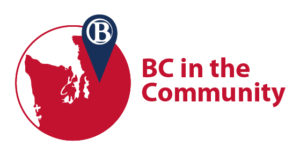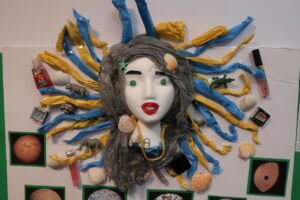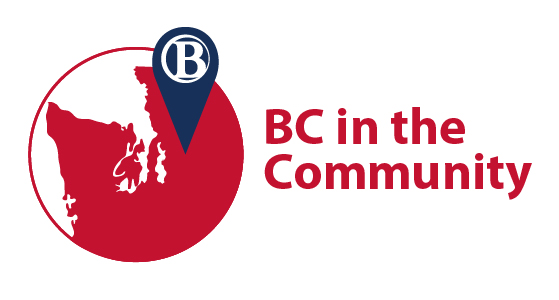When a community stands together, the mountains become movable
‘Trees’ by Christian Page (Performance & captions; website)
Lights in a collective are too bright to be dimmed
We didn’t love our communities because they were beautiful
Our communities are beautiful because we loved them”
For a broad community to support all people, it requires coordination between government, businesses, nonprofits, schools, houses of worship, neighborhoods, healthcare, and individuals. Put technically, communities function when the public sector, the private sector, and the civil society support each other.
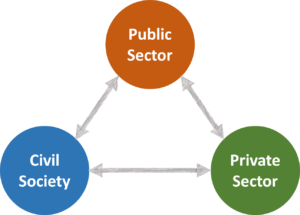
The individual – you – are the glue that holds all three pieces together. Your voice and taxes determine priorities in the public sector. Your money and choices shape the private sector. And your assistance and responsiveness bolster civil society. You play an essential role in ensuring that the community supports not only your interests but also the interests of everyone. Unfortunately, not all individuals have the same power behind their voice or money or responsiveness.
This is why devoting time and energy to creating a civic impact is so important.
If you are interested in exploring more deeply which types of civic impact you feel represents your strength, interests, and greatest impact, and you have 15 minutes, take this fun diagnostic survey (under 18 years old, take this one; faculty and staff, take this one). Then, check out the “Avenues for Civic Impact” below to learn more. And set up a time to meet with the Community-Engaged & Civic Education program within the RISE Learning Institute to talk about your results and next steps.
Below are different ways to think about engaging with your communities to make a civic impact. Take some time to explore the tabs; hopefully they will spark ideas! Contact RISE if you want to talk more.
How to Engage
There are a variety of ways to make a civic impact. While the most obvious for American citizens is to vote, there are options available to every resident of the United States. Keep in mind that civic engagement is cultural; it looks different depending on where you are in the world.
Look below for other ways that you can make a civic impact. As you do, reflect on what you have already done, what interests you, and what you can commit to doing.
- Volunteer with a nonprofit agency
- Volunteer for a political campaign or party
- Join your house of worship (e.g. church, synagogue, temple) in community volunteer activities
- Join your neighborhood association
- Commit to long-term, deeply engaged volunteering, such as by working a crisis hotline or becoming a CASA advocate
- Join the board of a nonprofit or community organization
- Donate your own money to a nonprofit to support a cause
- Run or participate in a fundraiser for a cause
- Donate your own food or goods to a nonprofit or community member
- Run or participate in a food or goods drive for a nonprofit
- Donate to a political campaign or party
- Run or participate in a fundraiser for a political campaign or party
- Like or follow a cause or nonprofit on social media
- Post on social media about a cause or issue that matters to you
- Like or follow a candidate or political party on social media
- Encourage others to be political active on social media
- Change (intentionally) your behavior or consumption habits for social or environmental reasons
- Convince others to intentionally change their behavior or consumption habits for social or environmental reasons
- Display signs, bumper stickers, and/or buttons in solidarity with a cause
- Display signs, bumper stickers, and/or buttons for a political candidate or party
- Attend a single-day demonstration or rally
- Participate in sustained, long-term protests
- Create art as a form of protest
- Avoid a product, company, or service as a form of protest (boycott)
- Lead or spread a boycott of a product, company, or service
- Join an activism or community organizing committee
- Sign a petition (online or in-person)
- Share petitions online
- Collect signatures in-person for a cause or initiative (canvas)
- Join a government commission or advisory group
- Join a local school or police advisory group
- Run for public office
- Attend a city council or government commission meeting
- Attend a school board meeting
- Contribute to public, written comments on pending legislation (federal, state, and/or local)
- Attend Lobby Days in Olympia to speak directly to legislators
- Write to and/or call elected officials to present opinion on public issues
- Contact media to present opinion on public issues
- Write an editorial in your local newspaper
- Vote (including in local, off-year elections)
- Register others to vote
- Participate in primary caucuses
- Complete the Census
- Remind others to complete the Census
- Volunteer as a poll worker on Election Day
- Serve as a delegate at a political convention
Avenues for Civic Impact
The Pathways of Public Service & Civic Engagement was created by Stanford University’s Haas Center for Public Service to rethink how individuals can engage with both the public sector and civil society. It considers the ways in which someone, no matter their field of interest, can make an impact in their communities.
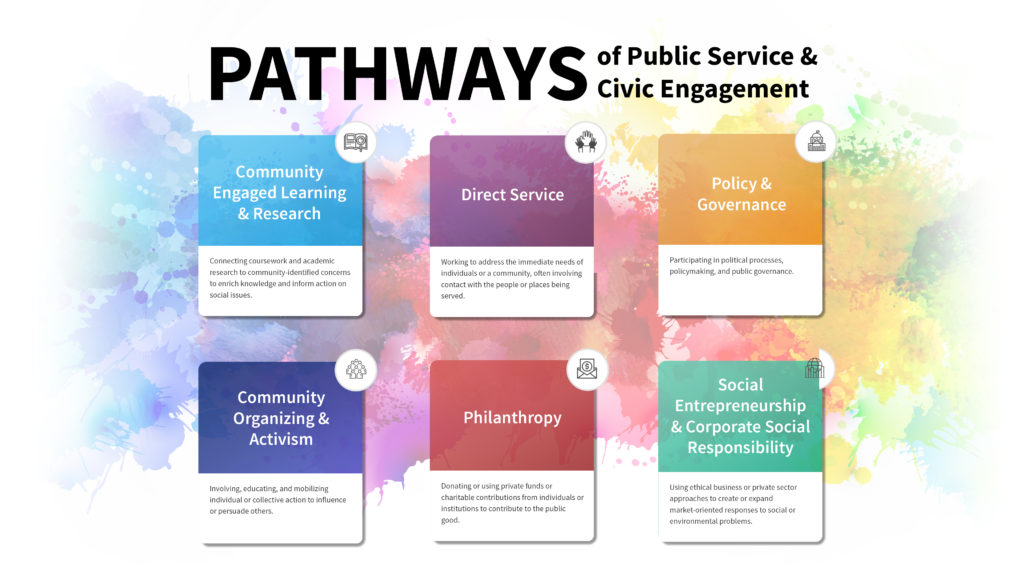
The RISE Learning Institute has been partnering with Stanford – and now Campus Compact – to bring this framework to Bellevue College under the Avenues for Civic Impact. The six avenues provide ways to find activities, careers, and even courses that fit any passion while making an impact on your local community and/or environment. For example:
- On-campus activities: Help register other students to vote; organize a clothes drive for a local homeless shelter; research gaps in campus sustainability practices
- Community activities: Use social media to raise money for anti-trafficking efforts; volunteer at a local arts fair; lobby the city government for safer driving laws
- Careers: Start an IT company that hires only veterans; work as an accountant for a nonprofit rehabilitating those struggling with addiction; become a police officer
- Courses: SOC 122 – Activism & Social Change; CES 241 – Multicultural Business Consulting; MKTG 204 – Fundraising in a Digital World; ECON 250 – Economics of Sustainable Living
Click below to learn more about specific activities that could fit within these six avenues. Then, reflect on the following: Which of these avenues speaks to me the most, and why? What activities would I enjoy now? Which avenue might make a meaningful and impactful career?

Connecting coursework and academic research to community-identified concerns to enrich knowledge and inform action on social issues.
What this looks like:
- Tromp through local swampy areas to collect data about amphibian populations, and then report this information to the state government.
- Work alongside nonprofits and residents of the International District to explore the local effects of the coronavirus.
- Take college classes that allow you to connect your field with community issues and see real-world applications of what you are learning (i.e. service-learning).
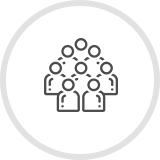
Involving, educating, and mobilizing individual or collective action to influence or persuade others.
What this looks like:
- Join a march in Seattle that focuses on current immigration issues.
- Attend monthly meetings with a grassroots movement that amplifies the voices of those left behind by certain state and local policies.
- Organize a signature-collection campaign on the college campus to address an issue that affects many students.
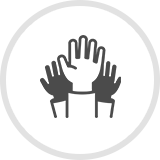
Working to address the immediate needs of individuals or a community, often involving contact with the people or places being served.
What this looks like:
- Volunteer at a food bank once per week.
- Assist with trail maintenance and cleanup in state parks.
- Serve on the board for a local nonprofit.
- Mentor local high school students through a program in your college.

Donating or using private funds or charitable contributions from individuals or institutions to contribute to the public good.
What this looks like:
- Volunteer to review grant proposals for a foundation that supports LGBTQ+ programs in rural areas.
- Donate to your public radio station.
- Organize a student group on campus to raise money for local blood banks during a time of crisis.

Participating in political processes, policymaking, and public governance.
What this looks like:
- Speak at your local city council meeting about issues happening in your neighborhood.
- Write a letter to legislators passionately explaining your perspective around an upcoming bill.
- Attend a specific lobby day in Olympia to ensure that your voice is heard on disability rights.
- Comment on proposed federal rule changes around immigration.

Using ethical business or private sector approaches to create or expand market-oriented responses to social or environmental problems.
What this looks like:
- Design a mobile app that helps urban residents donate to services that support people experiencing homelessness, with a small percentage fee.
- Only purchase fair trade products and encourage others to do the same, with the goal of pressuring other businesses to also adopt fair trade.
- Start a student-managed investment fund that invests only in socially responsible businesses.
Social Impact Wheel
The Social Change Wheel, developed by Campus Compact, denotes the various ways that an individual or group can contribute to societal / environmental change, and thus make a civic impact. Learn more about Version 2.0 below at IAMNCC.
Check out the image and short video below, and download the one-pager about the various categories. Then reflect on the following: Which part of the wheel am I most drawn to, and why? What is one thing I can do within that part of the wheel to make a positive change in the community? What campus-based strategy can I explore to help make social change?
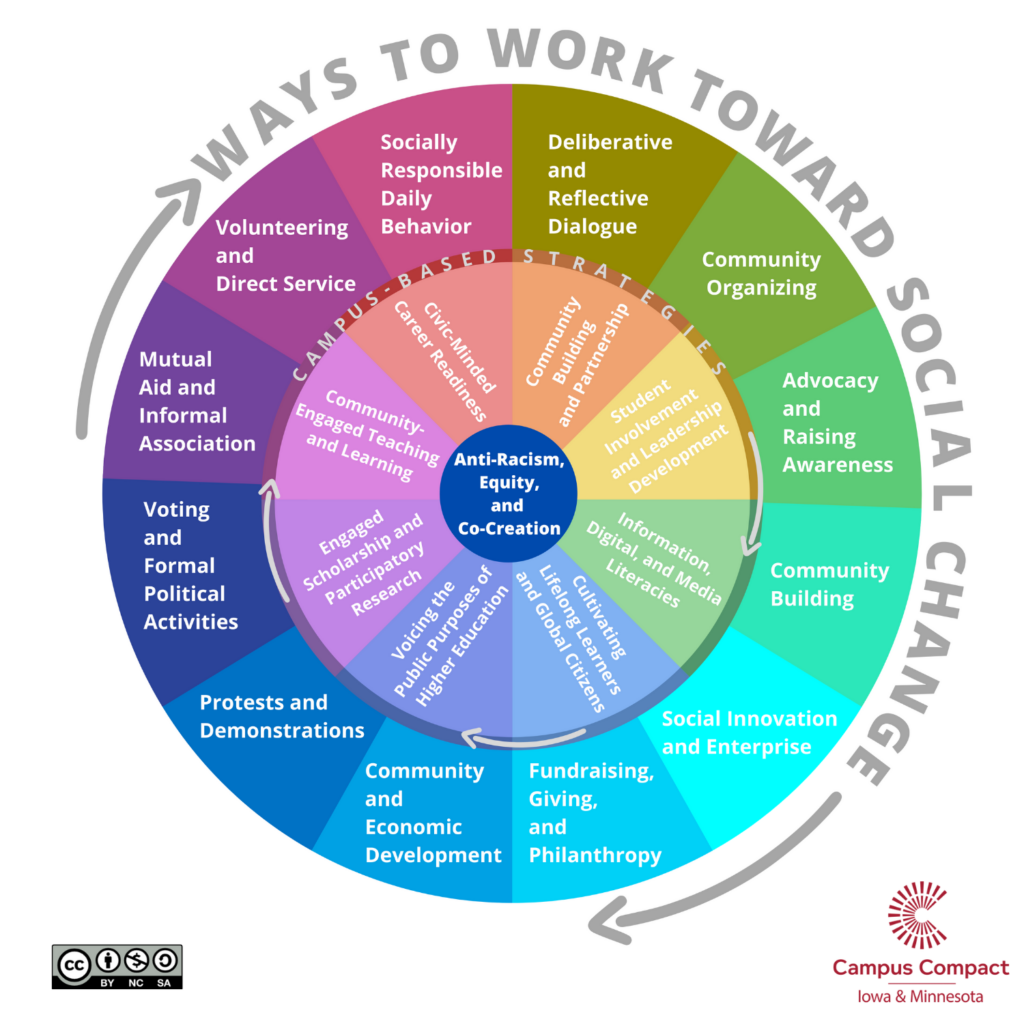
What to Do at Bellevue College
There are many ways for you to build your experience and passion for engaging with the broader community while at Bellevue College. One option is to take a Community-Engaged & Civic Education (CECE) class at Bellevue College. Through these courses, not only will you learn your course content, but you’ll build valuable skills while engaging with community-based organizations, complex contemporary challenges, and/or civic actions.
Another way is to visit BC in the Community, the college’s volunteer and service-learning portal. In it, you will find nearly 150 local nonprofit and government agencies open to volunteers. Interested in trail maintenance, criminal justice, homelessness, immigration, education, health care, or pretty much any other cause? Check out local agencies doing amazing work in these areas by clicking on the logo. Use the system to log hours, build a volunteer resume, collect badges, and more!
At the College itself, you can:
- Get earthy at the garden
- Crochet plastic bags into bedrolls for those experiencing homelessness
- Volunteer your time at the Brutus Food Pantry
- Serve the community through Bellevue College’s radio station
- And more!
For more information about what RISE and other offices at Bellevue College offer to help you engage with your communities, visit the RISE Student page. If you would like to talk with RISE about volunteering, contact the RISE Learning Institute to set up an advising session. To meet with someone about internships or careers for community impact, make an appointment with the Center for Career Connections. You can attend college events focused on civic impact and voting. Lastly, check out BC’s many student organizations, which provide excellent opportunities for you to engage with peers outside class while still impacting Bellevue College and broader communities.
Last Updated August 1, 2023

